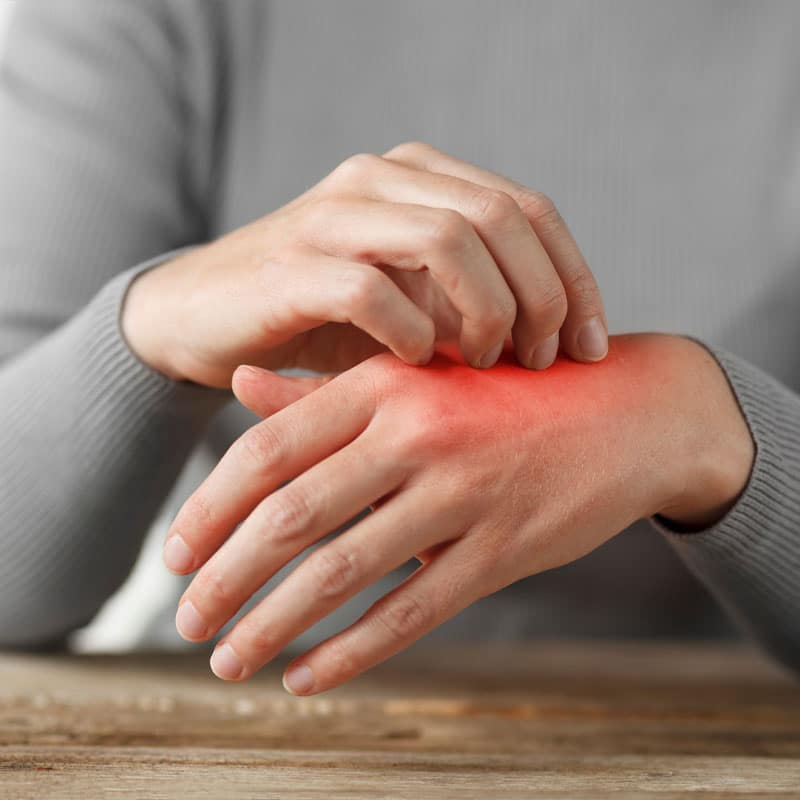index
Approximately 16 million Americans suffer from Rosacea, a chronic skin condition that causes redness and inflammation. Typically, redness begins on the cheeks and nose and slowly spreads over the forehead and chin. Rosacea commonly affects fair-skinned individuals who have a history of blushing easily. It often begins between the ages of 30 and 50. Initially, people may mistake Rosacea for sunburn; however, it will usually worsen. Here, we look into hormonal Rosacea, its symptoms, and what you can do to prevent flare-ups. The four stages of Rosacea are-
- Stage One – Intermittent flushing and facial redness.
- Stage Two – Persistent redness on their cheeks, nose, forehead, or chin.
- Stage Three – Minor, red, or pus-colored bumps. Their blood vessels may look like thin red lines (telangiectasias).
- Stage Four – Skin thickening and bumps on the nose.

Symptoms of Rosacea
Rosacea is a cyclic condition typically triggered by a situation or the ingestion of a particular substance. Seeking medical help will improve your skin and may stop or reverse the progression of Rosacea. Some common symptoms of Rosacea include the following.
- Eye Irritation – Approximately half of all Rosacea sufferers will experience dry, red eyes. Typically, irritation is mild; however, it can become severe. Rosacea can affect vision if left untreated.
- Nose Bumps—If Rosacea is left untreated, a person can develop knobby, small bumps on the nose, making the nose appear swollen. This condition, rhinophyma, is more common in men.
- Papules and Pimples—Small red pus-filled papules can appear on the face. Often, these are mistaken for adult acne; unlike blackheads or whiteheads, these papules contain pus.
- Redness—The face can become very dry, and facial redness resembles a sunburn. Flushing occurs when blood flows rapidly through the blood vessels in the face, which increase in size to handle the blood flow. Over time, facial redness persists.
- Telangiectasias—Rosacea causes blood vessels to enlarge to handle excess blood flow. These blood vessels look like thin red lines on your face.
Prevention of Rosacea
There are several triggers of Rosacea. The triggers can vary from person to person. Any condition that causes blood vessels to dilate or blood flow to increase can trigger Rosacea. Some common Rosacea triggers include-
- Alcohol – especially red wines
- Anxiety
- Cold temperatures
- Haircare products
- Exercise
- Extreme heat
- High histamine foods
- Hormones, menopause, and menstrual cycle changes
- Hot beverages
- Humidity
- Medical conditions
- Medicines
- Skincare products
- Spicy foods
- Stress
- Sunlight
- Wind
Hormone Imbalances Affect Your Rosacea
Rosacea can be affected by hormonal changes during a woman’s menstrual cycle or perimenopause. The hormonal changes during your monthly cycle or perimenopause can increase redness, flushing, and Rosacea bumps. Regulating hormone levels can help to reduce the occurrence of Rosacea flare-ups. The hot flashes that women experience during menopause can trigger Rosacea as well.

Hormone replacement therapy can help regulate hormones and reduce the frequency and severity of hot flashes. In addition to bioidentical hormones, certain medications can help reduce inflammation and the severity of flushing.
Emotional stress can trigger Rosacea. To reduce the risk of flare-ups, you can use various stress-relieving modalities.
- Yoga, journaling, meditation, and prayer can help decrease stress levels.
- Getting seven to nine hours of restful sleep each night can help counteract the effects of stress on the body, regulate hormone levels, and reduce inflammation throughout the body, including the face.

Female Hormone Quiz
Here are some hormone self-assessment questionnaires that can help evaluate your hormone levels. There is no substitute for consulting with your healthcare practitioner.
- Dealing with hot flashes, PMS, low libido, mood swings, headaches, anxiety, or unexplained weight gain? Try our comprehensive Female Hormone Quiz.

- For more focus on your estrogens, try our Female Estrogen Dominance Quiz.
Holistic Treatment For Rosacea
Identifying and addressing triggers is essential to minimizing Rosacea flare-ups. Most doctors recommend keeping a journal to help people pinpoint triggers.
- Avoid products that can dry the skin. Read the labels on your skincare products and avoid products that contain alcohol, fragrance, witch hazel, propylene glycol, peppermint, eucalyptus oil, camphor, and menthol.
- Always wear sunscreen to protect your skin and reduce the risk of flare-ups. For best results, choose a sunscreen with minimal ingredients. Finally, sunscreens containing niacinamide can help reduce redness.
Rosacea is a chronic facial skin condition that causes redness and pus-filled pimples. Imbalance in your hormones and Rosacea symptoms are closely connected. Learning to properly care for the skin and avoid triggers can be challenging. Our hormone specialists will work with you to regulate your hormones and improve your skin.






















